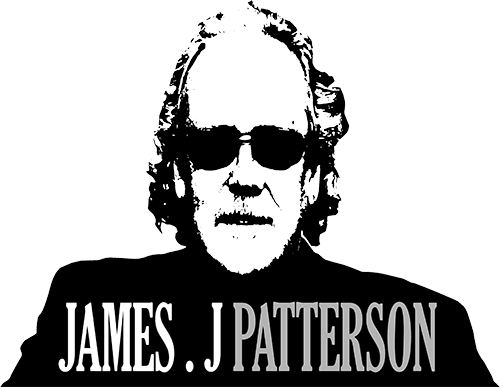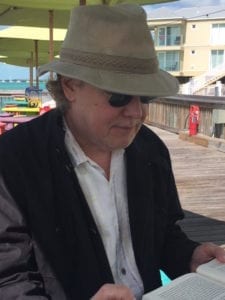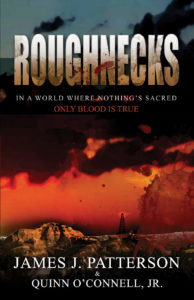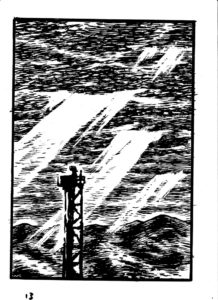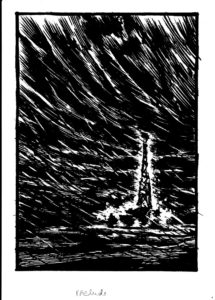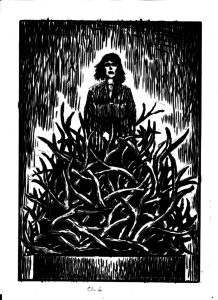Croatian-born author, Cubrilo, is able to read and write in several languages. She recently sat down with James J. Patterson to compare languages and talk about her new geo-political thriller novel, “Dethroned.”
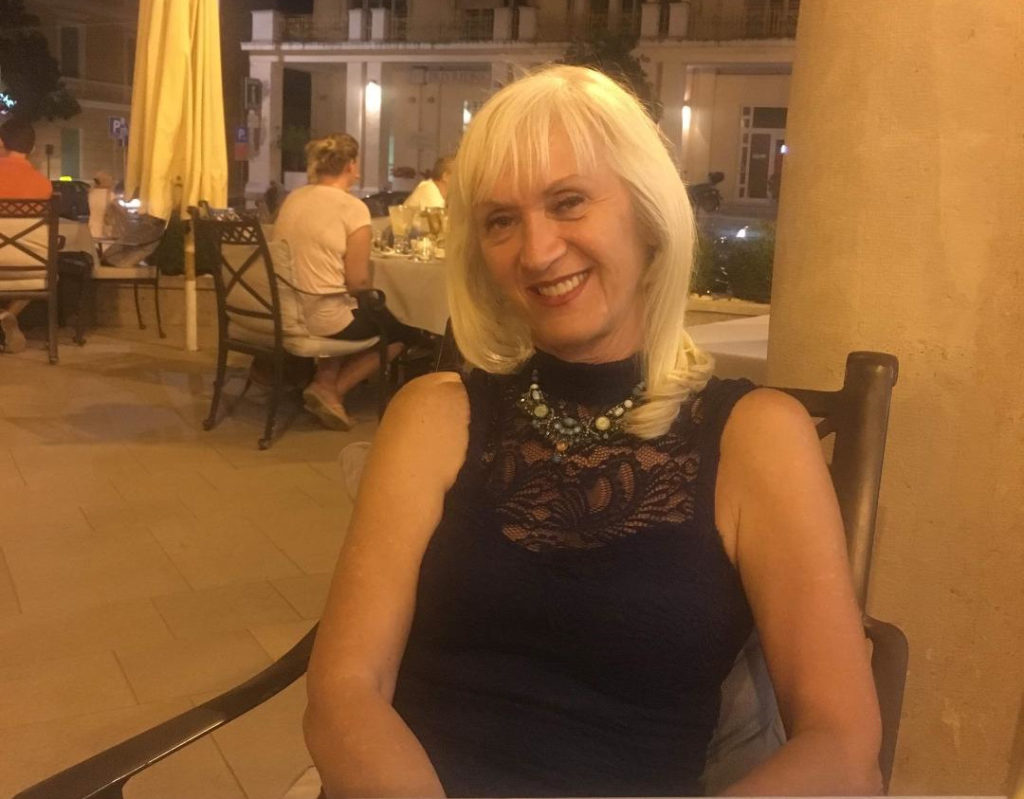
The difference between a work being translated and a work written in a second language fascinates me because a translator, in English, might Anglicize or Americanize the prose, but a writer for whom English is a second language will retain subtle turns of phrase generic to his or her thinking. These days we are lucky to have many ways to experience an author’s perspective. Hearing Branka Cubrilo read snippets of her previous works gave me a hint as to the tenor and musicality of her thoughts, and made the reading experience of her current novel Dethroned just that much more colorful. —JJP
JJP: I’m fascinated by, and a bit envious of, people who can write well in another language. How many languages do you speak, and when did you become proficient enough with English to write so creatively and with such confidence?
BC: I grew up speaking Croatian and several languages of the former republics of ex-Yugoslavia, plus Italian. I came to Australia in the early nineties knowing English as I had studied it at school. In Sydney, I enrolled in various courses for advanced English, and after a few years I obtained a diploma for interpreting and translating. I worked at SBS, a big radio and TV corporation, as a radio producer, where there was a need for Croatian and English. I translated the news, feature stories, and interviews from one language to another. I had published my books in Croatia, but got disinterested in publishing in a small country with such a small readership. One day, I simply decided to write in English; I felt confident enough to write in other language. I have a friend who helps with editing all my books, and my daughter, who was born in Sydney, helps with the editing, too.
JJP: Can you talk a bit about the books you were drawn to when you were young and the books that attract you now? Do you have a language that you prefer to read in?
BC: When I was young I read the European classics — from Tolstoy and Dostoyevsky to Voltaire, Rousseau, Balzac, and of course, Shakespeare. I loved the French Existentialists, especially Sartre, and I loved Proust. I also loved poetry. I memorized many of Lorca’s poems, I loved Neruda, and Dante fascinated me as much as Petrarch.
My taste hasn’t changed much, even though trends have. I like books that are beautifully written and philosophical, that have deep meaning and stir the soul, books that make me both feel and think. I don’t read “popular” literature; I don’t read about wizards, vampires, or zombies. I am interested in deep human emotions and relationships, and something that makes me wish to improve my own life or my own writing.
To the second part of your question, the answer is, yes, I love reading in English. It is a rich language and I can easily relate to its images and its rhythm.
JJP: Andalusia and Leonard Cohen appear in more than one of your books…coincidence?
BC: It is not a coincidence. Andalusia has a very specific place in my heart and life. I lived in Cadiz for a good part of 2002, on a Writer in Residence scholarship from the Spanish Ministry of Foreign Affairs. I wrote my memoir, The Mosaic of the Broken Soul, there. Indeed, I had gone there pretty broken, and I met the most extraordinary people in that beautiful land. It’s a land of creativity, the home of Flamenco, of Lorca, a land of all sorts of art, especially the art of loving life itself. It gave me a lot, taught me a lot, and helped me to dig deep into my feelings, showing me who I was, of what material I was made. I still feel I owe Andalusia and its people a lot.
Now, Leonard Cohen, my other love. I was about fifteen years old when I first heard the song “Suzanne.” Back then my English was pretty frail, but it didn’t’ matter —my heart and my soul stirred when I heard his voice. It was filled with some strange sadness and excitement, something dark and deep and longing. Leonard Cohen cracked open my creativity. I had been writing poems since I was almost a child, but when I understood his lyrics, I decided I wanted to write like him. I know I have never achieved that, but at least I can insert him in my stories, just as I do the Andalusian land, in order to thank him for being completely interwoven into the fabric of my life.
I saw Cohen several times live, and though I know it sounds silly, I had the feeling each time that he was there just because of me, just to tell me his tales personally. I was heartbroken when he passed away. Such a mystic, such a deep soul.
JJP: Your most recent book, Dethroned, is a geopolitical thriller of art, action, psycho-sexual turmoil, and shattered human relationships. In other words, it’s a big chewy novel with lots of characters, subplots, and twists and turns. I get the feeling there’s a lot of personal information woven into the plot of Dethroned: a society ruled by violent and stubborn men, fueled by ethnic pride, nationalist fervor, conniving priests, and the vulnerability of women who are forced to be merely the enablers of this patriarchic system. Might these frightening elements all be resonant in the author’s past?
BC: Dethroned is not directly about my own past. It is a story of my country, about two wars —WWII and the War for Independence that happened two and half decades ago, as a continuation of WWII. What really inspired me to write that book was the injustice which has been done to my country: lies, falsified history, bad propaganda, mass hysteria, and the fact that these lies and this injustice haven’t been fixed yet.
I tried to explain the causes of the war, what really happened in this part of the world, who was who, and how wars are continuations from previous ones, ones that have never really finished regardless of the passage of time. Despite propaganda, the Croatian War for Independence was all about destruction, turmoil, shattered human relations, displacement, hatred, revenge. It has now been almost 30 years since the war happened and nothing has been done to heal the wounds and repair the damages. Politicians have played the same card, nationalism, for the past 30 years and people still buy into it. I still can’t comprehend how easily manipulated people are by childish national pride. If it were a movie, it would be ridiculous — but it was real, and unbelievably painful for many generations, and it will be for many more to come.
JJP: In Dethroned, the enigmatic Pia and the steady and sturdy Veronika, each just graduated from high school, must emerge from school fully grown-up in order to find their own way out of the labyrinths of tradition, family prejudices, and violence that threaten to bring down their entire society. How did you come to create these two powerful and intriguing women?
BC: I often get asked if I am Pia. I am not Pia, exactly, but she is probably one of the strongest characters I have created and she really got under my skin. She penetrated so deeply into my psyche that on some days, I wasn’t sure where Pia ended and Branka started; we were shadows of one another. I lived her life for an entire year, but it isn’t the story of my life. I knew women like her — strong women, righteous, with sharp minds; creative women, warriors, free-thinkers. Those are my female characters, Pia and Veronika. When I go back to Rijeka, my home-town, and find my female friends from 30 years ago, nothing has changed. The women just got smarter and stronger. But almost nothing has happened in terms of changing things for the better. We still have, after 30 years, this appalling ultra-right government, and human rights are very shaky. Pia and Veronika are in some way me and my girlfriends. I knew them from my schools, from my street, and they made their mark.
JJP: You have a lot to say about feminine beauty and the trouble it can cause the individual who possesses it. Pia Odak is a poet. She’s quiet, loyal only to her art, detached, and ambivalent to the continuous assault that her beauty inspires in the men around her. It doesn’t matter where she might flee to — from Croatia, to London, then Australia, everywhere she goes her unaffected detachment drives her would-be suitors crazy. She finds a half-dozen ways and instances to tell them, plainly, that she’s not interested, yet no one listens. It appears to me that women all around the globe these days are finding the voice, and the audience, to state their case to the male world. Do you think you and others like you might be breaking through? Or is it time to throw up your hands and let the rest of us catch up if we can?
BC: Here I absolutely agree with you! When I was an adolescent girl I was expected to be obedient to men, not to confront them. It is a great, subtle practice that leads to the silence of women. If you were pretty, you had to pay a price for that. Everyone wanted a piece of a pretty woman, not necessarily to possess her sexually, but to be a part of her life. There is a big trap in beauty if there is no strong character. This character has to be built from an early age and by the right upbringing. I think a strong mother plays a crucial role.
I remember when I was young, if I rejected dancing with a young, pushy man, he would ask me if I was “some sort of a feminist or a lesbian.” If they couldn’t get what they wanted, they attacked or insulted. And back then women were quiet, they feared they might be wrongly judged or labeled. The more outspoken girls and women, those who fought for their voices, their own way of living, their thoughts and rights, were immediately labeled witches or lesbians! I was lucky because I had an older brother, a very tall, athletic, and popular boy; everybody knew I was his sister, which gave me sound protection. Not only that, it gave me the right to protect other girls and speak on their behalf. I was fearless, and that was my nature. I raised on my own a daughter who is independent and kind, generous, intelligent, and beautiful, yet she is a strong, modern young woman who is outspoken and knows her own strength and importance. I always tried to speak for the equality of women, for our independence, for our voices being heard and respected.
JJP: In Dethroned, the character Hugo, a boy with Downs Syndrome, inhabits the spiritual center of the narrative. Do you have personal experience with those affected by Downs Syndrome?
BC: No, I never had anyone in my family or approximate vicinity with Down Syndrome. I have a friend with two autistic girls, who I have known and loved since they were born. And thanks to seeing their sweet souls grow, I developed a similar character who would spread love and innocence. He approached gently, softly, and I created him with a lot of gentleness. I love him so much. As with women, I am always prone to protect those who are subject to judgment or who are pushed aside by society or those whose rights are denied.
JJP: Also, in Dethroned, the dead are ever present. Two notable characters die and return in the minds of those who are open to them. Can you say a little something about that?
BC: Oh, I have to be very careful here (smile). It may be that I am still under the influence of Magical Realism of Gabriel Garcia Marquez, whose books I loved very much years ago. I think people who suffer a loss, particularly of someone incredibly close to them, might imagine that this person still exists on some level or plain. Sometimes, when one is in a lot of pain, one might search for the answer on the “other side,” wishing and wanting to connect with the other world. I don’t know whether this is possible to achieve, or even if that other world exists at all, but both of my characters, Pia and Veronika, found solace in the notion that their dearest are still around them, and could see them and somehow assist in their daily struggles.

At the age of eighteen Branka Cubrilo wrote her first novel I Knew Jane Eyre, which won the Young Writers Award in 1982. Soon after she wrote a sequel called Looking for Jane Eyre. In 1999 Branka published the book Fiume Corre – Rijeka Tece, a year later Requiem for Barbara, and in 2001, Little Lies – Big Lies. (These titles are available here in Croatian)
The Lonely Poet and Other Stories is Branka’s third book published in English by Speaking Volumes, following her earlier novels The Mosaic of the Broken Soul (2011) and Fiume – The Lost River (2014). Branka’s latest novel is Dethroned.
Branka is fluent in three languages (English, Italian and Croatian) and she works as an interpreter and translator.
Now she predominantly writes in English and translates her earlier works into English
